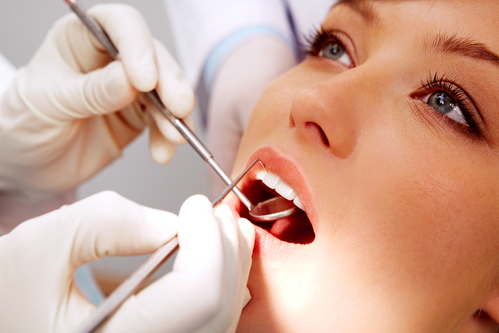Signs It’s Time To Replace Your Dentures
Dentures can be life-changing for those who have lost some or all of their natural teeth. A good quality denture can restore your ability to eat, speak, and smile with...

Maintaining excellent dental health is important regardless of your age. Frequent and regular cleanings are more critical than you might think. Beyond keeping a white, healthy smile, teeth cleanings can help your overall health too. We recommend visiting the dentist for cleanings and exams twice a year, or as often as your dentists recommends.
Here are 6 great reasons to schedule your biannual teeth cleanings:
The number one reason to visit your dentist biannually for teeth cleanings is to help prevent cavities. When plaque begins to eat away at the outer layer of your tooth enamel, small holes start to form. This sticky white-colored film that builds up on your teeth is called plaque and is the leading cause of tooth decay. Brushing and flossing daily helps to prevent plaque buildup from clinging to your teeth, but isn’t enough on its own. Professional cleanings every six months is the most effective prevention technique.
The number one cause of tooth loss is from gum disease. First beginning as plaque build-up, gum disease is a significant cause of tooth loss in most adults. As the disease advances, plaque moves further down the tooth where it can destroy the supporting bone in your jaw. This bone destruction causes teeth to loosen and eventually fall out. The chances of losing teeth to gum disease can be greatly reduced through regular cleanings in combination with great at-home oral hygiene habits.
Drinking coffee, red wine, dark tea, or using tobacco products can stain your teeth. A dental cleaning can remove built-up stains and leave you with freshly polished teeth. Removing these surface stains will result in a whiter, brighter smile.
Excellent oral hygiene habits are a great way to prevent halitosis, or chronic bad breath, from happening to you. Brushing and flossing is a good start, but if you have an underlying dental issue such as tartar buildup, you may struggle with bad breath. Tartar is a hard, crusty deposit that stains your teeth and traps bacteria. Scaling, which is a technique dental hygienists use to remove tartar buildup from along the gum line, is necessary to freshen your breath and eliminate halitosis.
The current health of your mouth directly impacts the rest of your body. Regular teeth cleanings can help to lower your risk of heart attack and stroke. Chronic inflammation associated with gum disease can lead to hardened arteries, which can increase your risk of a heart attack or stroke. Many other seemingly unrelated medical conditions, including kidney disease and diabetes, can be detected in their early stages by merely visiting your dentist.
Many people associate the dentist with spending money, so one of the biggest reasons people skip routine cleanings is to save. However, the cost to clean and polish your teeth is far less than the restorative dentistry required to fill a cavity or treat periodontal disease. Preventative care is the best way to help you avoid any unpleasant and potentially costly repairs in the future.
When you do head in for one of your twice-yearly cleanings, there are a few things you can expect during your routine examination and cleaning. During your visit, a hygienist or dentist will remove tartar and plaque buildup from the teeth. If it’s been a while since your last cleaning, this process can take a bit longer than usual. Polishing your teeth using a paste to remove additional plaque and stains is followed by flossing.
Dr. Aubrey Baudean DDS will then examine your teeth to look for any potential issues, such as signs tooth grinding, cavities, gum disease, or any other matters. It is always our goal to make every cleaning and exam as quick and painless as possible regardless of if we saw you six months ago, or if it’s been longer than recommended since your last cleaning.
Ready to begin reaping the benefits of regular teeth cleanings? Call today to schedule your next cleaning and exam.